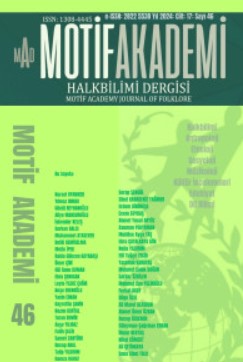TÜRK KÜLTÜRÜNDE TÖREN YEMEKLERİNE İŞLEVSEL BİR YAKLAŞIM
A FUNCTIONAL APPROACH TO CEREMONIAL FOOD IN TURKISH CULTURE
Author(s): Yılmaz IrmakSubject(s): Customs / Folklore, Sociology of Culture
Published by: Motif Halk Oyunları Eğitim ve Öğretim Vakfı
Keywords: Turkish Culture; Turkish Cuisine; Ritual Meals; Ritual; Function;
Summary/Abstract: Turkish cuisine culture varies depending on climate, geography, nature, war, migration, religious beliefs, customs, and traditions. Turkish cuisine, which has been enriched throughout history with the influence of various civilizations, has come to the fore with its flavors preferred all over the world. Ceremonial dishes, which gain meaning with certain rituals in Turkish cuisine, are eaten during ceremonies and with the participation of community members. This increases the importance of meals and shows that the food eaten is not just for satisfying hunger. Food and beverages served on special days and celebrations, religious and social festivals have a ceremonial meaning. It is understood that ceremonial meals have functions such as joy, celebration, commemoration, protection from evil spirits, status change, healing, and protection from diseases, blessings, receiving prayers, psychological relief, socialization, reinforcing unity and solidarity, gaining identity, preserving, and transmitting culture. Birth, circumcision, marriage and death, which are considered to be important turning points in human life and are called "transitional periods" are the times when ceremonial meals are held, as well as the religious Ramadan Eid, Eid al-Adha, Kandil nights, Ashura, Rain Prayer as well as various food, beverages and beverages on the days of Nevruz, Hıdırellez, Mating of Sheep and Crocus Day which are seasonal ceremonies. In Alevi culture, the dishes served during the Cem ceremony can also be included in the ceremonial food group. The food eaten in lodges and dervish lodges has a meaning as well. Almost all of these dishes are made and eaten at certain times on special occasions. In this article, ceremonial dishes within the Anatolian Turkish cuisine culture, which has a deep-rooted and rich accumulation, will be discussed and the preparation, purposes of eating place and time and meaning of the meals will be emphasized from a functional perspective. Thus, we will try to focus on the historical, social, cultural, religious, psychological and mythological foundations of these dishes, which gain meaning within the framework of the food-ritual relationship.
Journal: Motif Akademi Halkbilimi Dergisi
- Issue Year: 17/2024
- Issue No: 46
- Page Range: 486-515
- Page Count: 30
- Language: Turkish

